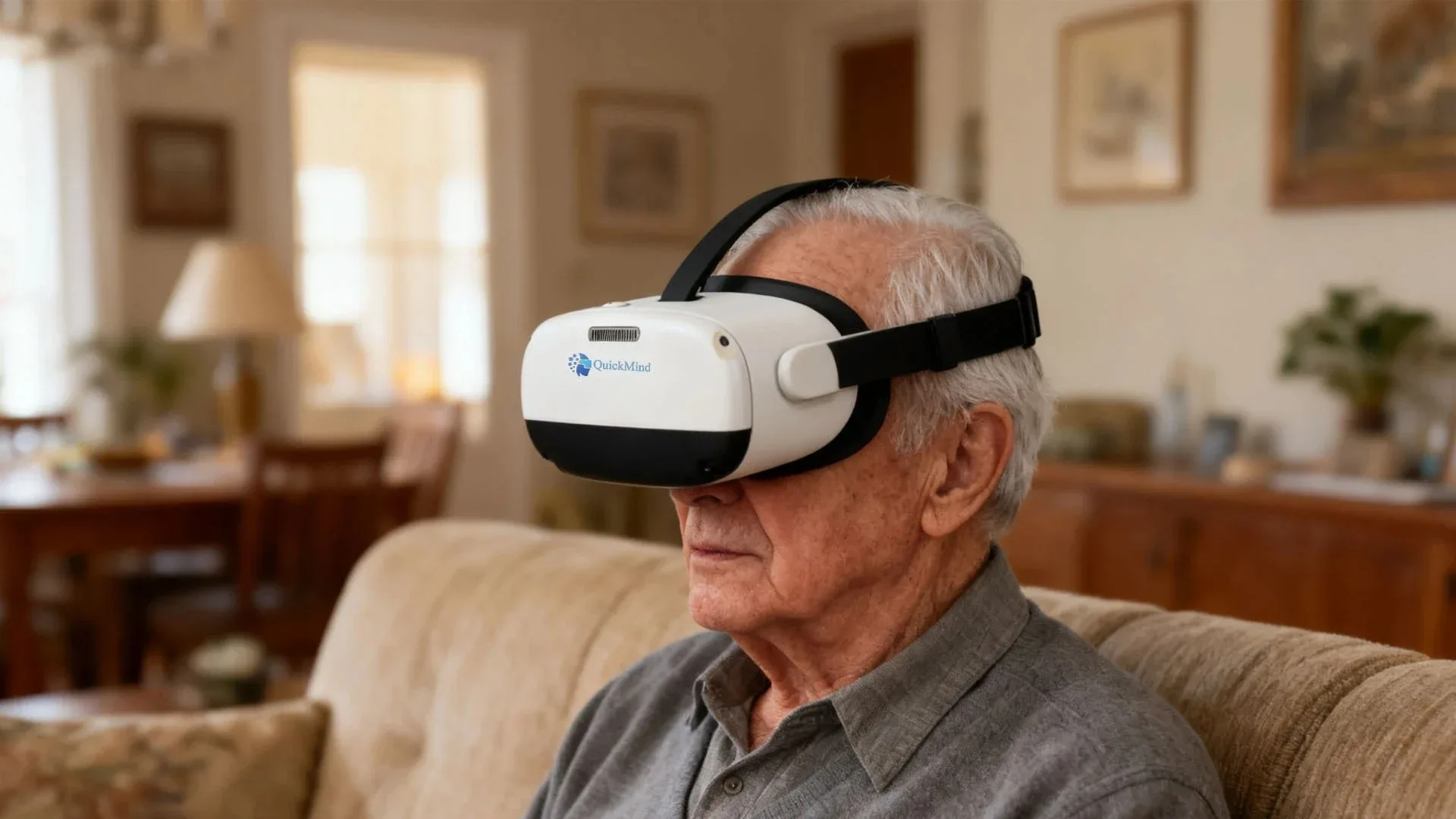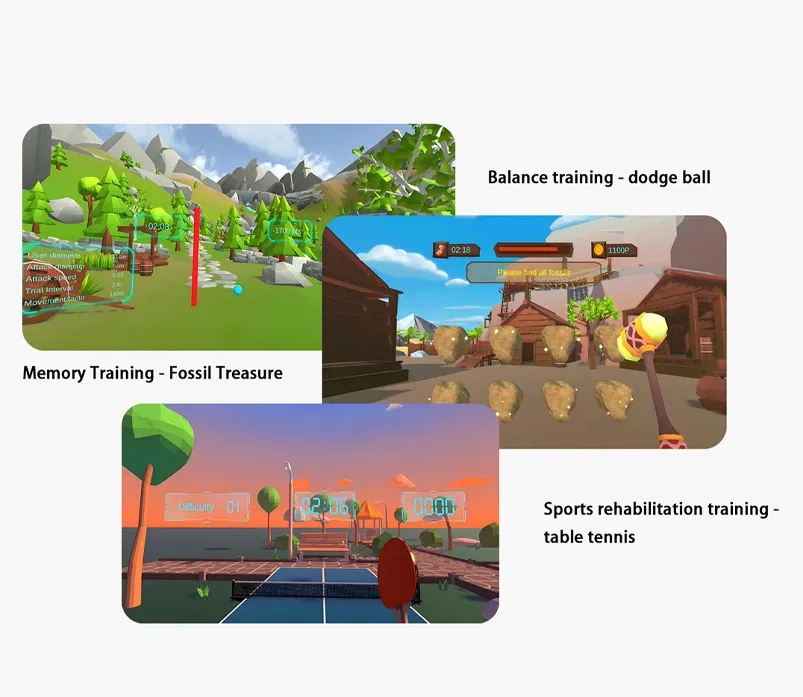
Progressive research indicates that interactive virtual spaces approach can dramatically improve the states of persons diagnosed with neurodegenerative disorders. By conveying them to relaxing surroundings, VR delivers a special avenue for mental involvement, sentimental adjustment, and interpersonal communication. A variety of tests have indicated that VR therapy can reduce distress, stress, and despondency in dementia patients individuals while also augmenting their recollection, mindfulness, and conversational capabilities.
- VR allows individuals with dementia to recall cherished memories through engaging illustrations.
- Likewise, it can allocate a risk-free and encouraging space for social contact, building a perception of union and togetherness.
- Experts think that VR therapy has the chance to overhaul dementia care by delivering new and advanced paths to combat the difficult challenges faced by subjects diagnosed with this condition.
Advanced Digital Care for Cognitive Support in Alzheimer's
Increasing computerized strategies are gaining recognition in the territory of mental capacity building for participants dealing with neurodegenerative Alzheimer type. These software exploit computing power to boost brain efficiency and theoretically lessen the spread of the illness. Playful routines, personalized support, and intellectual training are some illustrations of tactics being analyzed in this evolving sector. While experiments are continuing, digital therapeutics grant a supportive route for strengthening the well-being of those suffering from Alzheimer's dementia.Navigating Reality Through Virtual Landscapes: A Novel Approach to Alzheimer's Treatment
Involving subjects managing Alzheimer's condition, the steady deterioration of remembrance and intellectual capacities can considerably impair their capacity to interact with the surrounding environment. This disabling disorder often causes in seclusion, agitation, and a lowered personal identity. Recent enhancements in virtual reality technology provide a groundbreaking option to alleviate these concerns by constructing immersive environments that can encourage the brain and rekindle cognitive function.
Virtual reality landscapes tailored specifically for persons with Alzheimer's can move them in safe locations, such as their former home or a preferred green space, awakening positive memories and mitigating anxiety. Through interactive exercises, these virtual scapes can also enhance cognitive abilities like memorization, vigilance, and analytical skills.
The beneficial impacts of virtual reality in Alzheimer's support are massive. Early studies have revealed positive results, with clients reporting improvements in cognitive function, mood, and overall quality of life. As this technology proceeds, it holds the key to innovating the way we approach Alzheimer's disease, making available a new pathway for assistance and motivation.
Virtual Memory Therapy for Alzheimer's Clients
Reminiscence therapy is a commonly used technique used to improve cognitive function and emotional well-being in individuals with Alzheimer's disease. This historic form of therapy involves stimulating patients to retrieve past experiences, often through conversation. However, a advanced approach is emerging: VR-mediated reminiscence therapy.
This immersive innovation utilizes virtual reality headsets to immerse patients in virtualized environments that recapture memories from their past. By going through these artificial surroundings, individuals with Alzheimer's can engage with their past in a noteworthy way.
VR's Promise for Dementia Care: Enhancing Memory and Cognition
Virtual reality (VR) is emerging as a up-and-coming instrument in the fight against dementia, granting trailblazing ways to enhance memory and cognition. By crafting immersive settings, VR can aid individuals with dementia access memories, take part in meaningful activities, and augment cognitive skills. Studies have confirmed that VR interventions can generate important improvements in memory recall, attention, and spatial awareness. Moreover, VR provides a controlled and motivating space for individuals with dementia to explore, reducing feelings of isolation and fear.
- In addition, VR can be adjusted to individual needs and preferences, making possible heightened levels of communication.
- Regardless of the chances of VR, progressive research is needed to fully understand its long-term outcomes in dementia care.
Reawakening Past, Forging Connections: VR's Power in Alzheimer's Socialization
Interactive simulated realms is emerging as a novel technology in the sphere of neurodegenerative conditions. By generating engaging and mutual platforms, VR has the ability to renew memories, cultivate social interaction, and elevate the overall quality of life for users struggling with Alzheimer's. One of the most influential aspects of VR is its ability to take users to vintage venues and memories from their past. Whether it's a stroll in a childhood home or a representation of a beloved holiday, these virtual experiences can evoke happy memories and reinforce cognitive faculties. Furthermore, VR can facilitate social interaction by associating individuals with others who share similar interests. This VR can be particularly profitable for people with Alzheimer's who may face difficulties with traditional social involvement. By offering a safe and stimulating virtual space, VR can ease feelings of isolation and loneliness, which are common among persons living with Alzheimer's. Overall, VR holds immense prospect for revolutionizing the lives of subjects with Alzheimer's by reawakening memories, rebuilding connections, and refining their quality of life. As technology proceeds to advance, we can expect even more novel applications of VR in the field of dementia care.Leveraging Cognitive Training: Utilizing VR for Alzheimer's Symptom Management
Simulated immersive settings is rapidly emerging as a innovative tool in the realm of cognitive training, particularly for individuals suffering from Alzheimer's disease. By immersing patients in interactive and engaging virtual environments, VR-based interventions can enhance cognitive functions such as memory, attention, and problem-solving. These games commonly incorporate elements of storytelling, exploration, and social interaction, making the training process more enjoyable. Studies have shown that VR-based cognitive training can lead to substantial improvements in cognitive performance, hypothetically delaying the progression of Alzheimer's symptoms. Moreover, VR provides a safe and controlled environment for patients to practice new skills and improve their confidence.
- Game-enhanced procedures in VR training can make it extremely immersive and fun for clients with brain function issues.
- VR simulations can offer realistic scenarios that drive and improve cognitive functions.
- Personalized VR experiences can cater to individual needs and learning styles.
A Simulated Second Chance: Exploring the Benefits of VR Environments for Individuals with Dementia
Alluring digital environments offer a breakthrough and advantageous avenue for persons suffering dementia. These platforms can emulate familiar environments, allowing those affected by cognitive decline to relive cherished memories and encourage a sense of consolation. By addressing the effects of dementia, VR realities have the power to improve quality of life for both clients and their helpers.
- Evaluations indicate that VR techniques can positively impact cognitive function, psychological well-being, and even locomotor abilities in individuals with dementia.
- Moreover, VR offers a safe and supportive environment for participation, reducing the risk of danger.
- Also, VR can strengthen social links by allowing individuals with dementia to collaborate in digital activities with others.
VR: A Promising Approach to Alzheimer's Diagnosis and Treatment
Alzheimer syndrome presents a sophisticated difficulty, often staying hidden in its early stages. Nevertheless, virtual reality (VR) is becoming prominent as a cutting-edge tool for initial identification. Through immersive platforms, VR can evaluate cognitive faculty in ways that traditional methods find challenging to. This potential allows for speedy involvement strategies, potentially pausing disease progression and advancing the quality of life for persons with Alzheimer's.
- VR-based assessments can test memory, attention, and spatial awareness in a safe and controlled setting.
- Personal VR platforms promote user engagement in cognitive enhancement practices.
- Digital virtual settings create opportunities for people with Alzheimer's to link and participate.
Facilitating Dementia Communication and Interaction Through VR
{In the realm of dementia care, innovative technologies are emerging to strengthen the lives of persons with neurodegenerative disorders. Virtual reality (VR) is one such system that holds immense prospect for strengthening interaction and communication for dementia sufferers via VR. By creating immersive and engaging virtual environments, VR can stimulate cognitive function, reduce behavioral issues, and ultimately improve the overall well-being of people living with dementia.
VR experiences adapted to dementia patient needs can range from recall therapy sessions that return users to significant former experiences, to interactive games that promote social interaction and cognitive engagement. Furthermore, VR has the capacity to connect people with dementia to support circles, regardless of physical space, fostering a sense of acceptance.
- VR can assist in reducing agitation and anxiety by providing a calming and focusing environment.
- Assessments have shown that VR interventions can lead to improvements in cognitive function, mood, and social interaction in clients experiencing cognitive decline.
- As technology continues to advance, we can expect even more innovative and {effective|beneficial|helpful|powerful|impactful|successful|productive|efficient
